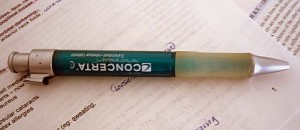After seeing The Colbert Report’s show the other day, the flashbacks started. You see, in this segement, he talks about the perks that doctors get from pharmaceutical companies.
Unfortunately (or fortunately if you love Colbert), the part I’m referring to (Corporate Health) isn’t until 4 minutes into the video, but in it he says that pharmaceutical companies are cutting back on those perks (pens, mugs, etc) in order to save money.
Now, for the flashbacks. When I was 15, I worked in a medical office as a file clerk for a summer job. I’d say that throughout the summer that I worked there, I probably only had to get my own lunch maybe 4 times. That’s a fairly liberal estimate too. Why did I never get my own lunch? It’s not because I wasn’t eating.
You see, the drug reps — that’s what we call them — would often buy lunch or breakfast for the office in exchange for hanging around and trying to talk to the doctors while they eat. Often times, it really turned out that Mr. or Ms. Drug Rep would sit there and watch the young file clerk read her summer list of novels for Honors American Lit. And since the young file clerk always took a late lunch in order to avoid a packed break room, it often was just her and the drug rep. The file clerk read. The drug rep shifted in their chair. Drummed their fingers on the table. Cleared their throat. Then the inevitable question would arise.
“So, does Dr. ____ usually eat in?”
“It varies.” The young clerk says in the very vague way that only teenagers can seem to get away with.
“Like how?”
“Well, Thursdays are Dr. _____’s half day. He sees some people and then plays golf for the rest of the day.” (By the by, if you think doctors playing golf is a stereotype, it may well be. I’m sure that you can find plenty of doctors who don’t play golf, but there is a basis for that particular stereotype. Jus’ sayin’.)
“I see, but this isn’t Thursday.”
“Right, but Dr. _____ is a specialist. He does rounds at the hospitals — referals, you know — and only comes to the office to see patients or to talk to the other doctors.”
“Mmm.”
The industry just makes me laugh and cry, really. The entire health care system. It’s so sad that you have to laugh at it just so it doesn’t drive you crazy. These pharmaceutical companies spend all this money with their drug stamped on pens, pads, mugs, stress balls, lunches, little foam things in the shape of organs–no really, I have a yellow brain like that. They spend all this money just for doctors to avoid talking to them. Oh, and these are just little things. I know companies used to give away tickets to sports events, or dinners to extremely expensive restaurants (Smith and Wollensky comes to mind). I mean, you can get some pretty serious loot from being a doctor.
Don’t get me completely wrong. For the most part, I’m not a fan of drug reps. I find them to be more of an annoyance and waste of money that could be going to patients, but they are somewhat successful at times. Doctors will generally listen to whatever new drug this person is marketing, but I’m most concerned that this is the primary form that doctors hear about new medicines.
If a drug is truly going to change patients’ lives then why is it necessary to give so much of this crap away just to get attention? Sure, providing medical offices with lunch may give you face to face time with the doctors, but the doctors I’ve don’t appear overly persuaded by a free meal or a few pens. If the drug truly would work well for the patients, then they’ll try it and if not, then they won’t.
Of course, that’s just from personal experience. I would like to see some studies or statistics on whether drug reps truly do make a difference or not. I have a feeling, though, that it’d be hard to find a control group of physicians who have never been approached by a drug rep.

